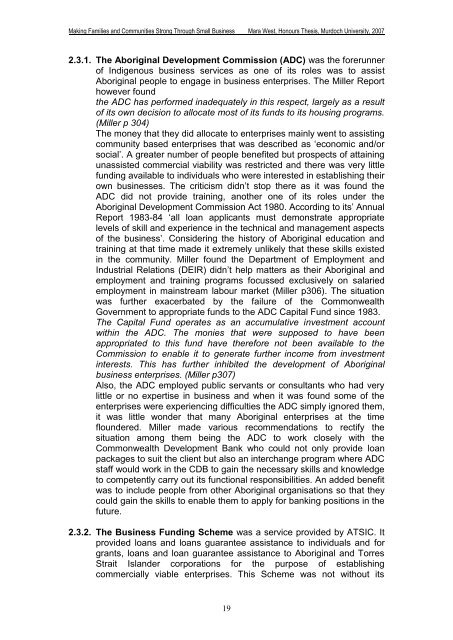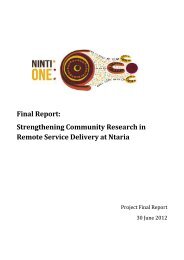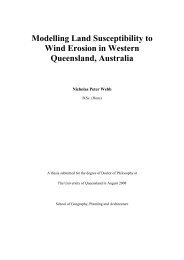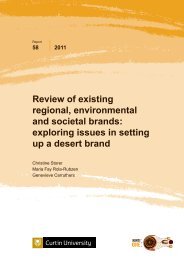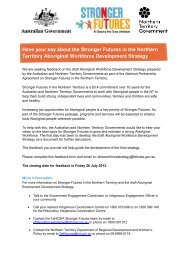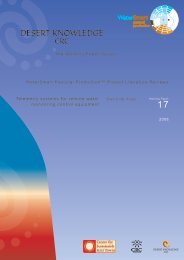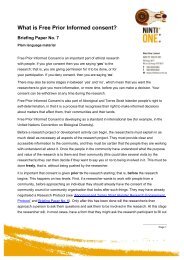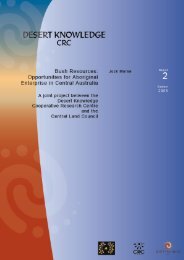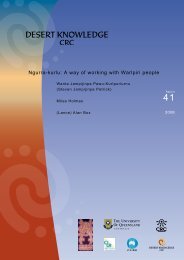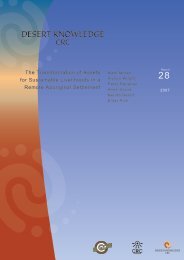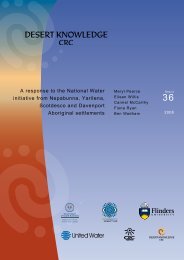MAKING FAMILIES AND COMMUNITIES STRONG THOUGH SMALL BUSINESS
making families and communities strong though small ... - Ninti One
making families and communities strong though small ... - Ninti One
- No tags were found...
You also want an ePaper? Increase the reach of your titles
YUMPU automatically turns print PDFs into web optimized ePapers that Google loves.
Making Families and Communities Strong Through Small Business Mara West, Honours Thesis, Murdoch University, 20072.3.1. The Aboriginal Development Commission (ADC) was the forerunnerof Indigenous business services as one of its roles was to assistAboriginal people to engage in business enterprises. The Miller Reporthowever foundthe ADC has performed inadequately in this respect, largely as a resultof its own decision to allocate most of its funds to its housing programs.(Miller p 304)The money that they did allocate to enterprises mainly went to assistingcommunity based enterprises that was described as ‘economic and/orsocial’. A greater number of people benefited but prospects of attainingunassisted commercial viability was restricted and there was very littlefunding available to individuals who were interested in establishing theirown businesses. The criticism didn’t stop there as it was found theADC did not provide training, another one of its roles under theAboriginal Development Commission Act 1980. According to its’ AnnualReport 1983-84 ‘all loan applicants must demonstrate appropriatelevels of skill and experience in the technical and management aspectsof the business’. Considering the history of Aboriginal education andtraining at that time made it extremely unlikely that these skills existedin the community. Miller found the Department of Employment andIndustrial Relations (DEIR) didn’t help matters as their Aboriginal andemployment and training programs focussed exclusively on salariedemployment in mainstream labour market (Miller p306). The situationwas further exacerbated by the failure of the CommonwealthGovernment to appropriate funds to the ADC Capital Fund since 1983.The Capital Fund operates as an accumulative investment accountwithin the ADC. The monies that were supposed to have beenappropriated to this fund have therefore not been available to theCommission to enable it to generate further income from investmentinterests. This has further inhibited the development of Aboriginalbusiness enterprises. (Miller p307)Also, the ADC employed public servants or consultants who had verylittle or no expertise in business and when it was found some of theenterprises were experiencing difficulties the ADC simply ignored them,it was little wonder that many Aboriginal enterprises at the timefloundered. Miller made various recommendations to rectify thesituation among them being the ADC to work closely with theCommonwealth Development Bank who could not only provide loanpackages to suit the client but also an interchange program where ADCstaff would work in the CDB to gain the necessary skills and knowledgeto competently carry out its functional responsibilities. An added benefitwas to include people from other Aboriginal organisations so that theycould gain the skills to enable them to apply for banking positions in thefuture.2.3.2. The Business Funding Scheme was a service provided by ATSIC. Itprovided loans and loans guarantee assistance to individuals and forgrants, loans and loan guarantee assistance to Aboriginal and TorresStrait Islander corporations for the purpose of establishingcommercially viable enterprises. This Scheme was not without its19


